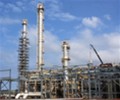

Global refining runs are expected to continue rising in July and August due to increasing vaccination rates and easing social distancing measures around the world, the International Energy Agency (IEA) said.
The Paris-based agency, however, expected the trend will lose momentum in winter due to seasonal maintenance of refineries.
Refiners around the world significantly reduced their operations in 2020 as they faced an unprecedented fall in fuel demand brought about by the coronavirus pandemic and mobility restrictions. The lockdowns at their peak destroyed over 20% of global oil demand.
The refining runs have been rising since February as widespread vaccination programmes started in several countries and restrictions were eased. After stagnating in May, global refining throughput increased by 1.6 million barrels per day (bpd) in June, IEA said in its monthly report.
That was the largest monthly increase since July 2020, which supported crude oil prices. Increased product supply and higher crude oil prices negatively affected product cracks and refinery margins in June.
Runs are expected to increase by another 2.7 million bpd over July and August from June levels but will start declining in September and October as refinery maintenance season begins.
The gap between the global refineries throughput in the fourth quarter of the year and its peak in 2018 will be around 2.6 million bpd. The global throughput is not expected to reach 2018 levels by the end of next year, according to IEA.
“The main deficit will be on account of Europe and North America, while the Middle East, some parts of Asia, and Latin America are on track to surpass 2018 levels in 2022,” IEA said.
The activity of European refiners is not expected to recover to pre-pandemic levels any time soon, IEA said. As a result, annual average throughput rates of Chinese refiners are expected to exceed the European rivals by 3 million bpd in 2022. Chinese refiners reached parity with European refineries in 2019 in terms of throughput.
IEA said stalled talks by top oil producers over releasing more supply could deteriorate into a price war just as COVID-19 vaccines are sending demand for oil surging.
Source: Reuters (Reporting by Bozorgmehr Sharafedin; Editing by Steve Orlofsky)